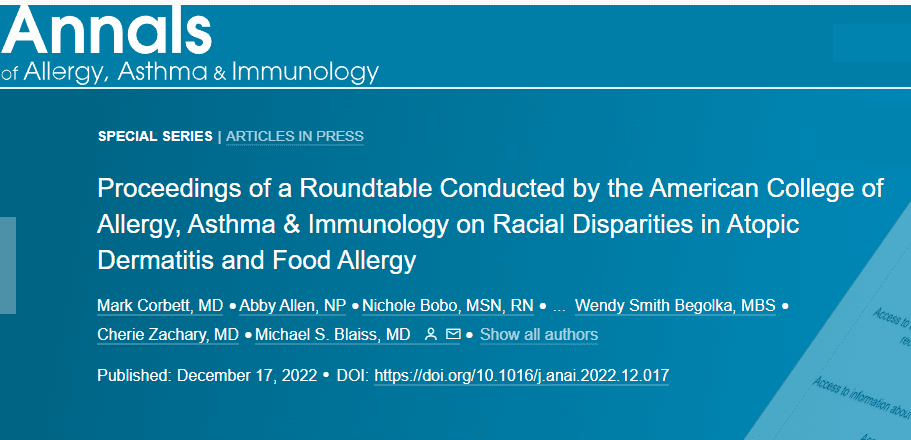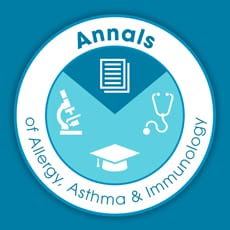There are many types of health disparities – the differences in overall health and access to health care experienced among various population groups. These disparities may be affected by racial, ethnic, socioeconomic, geographic or other factors, which often overlap. This Resource Center focuses on health disparities specific to allergy/immunology based on racial factors and inequities. It presents relevant information, data, education and other resources to help health care providers close gaps and reduce disparities in the quality of care for allergy/immunology patients.
Originally posted Dec. 9, 2020; most recently updated May 30, 2024.

Statement on race disparities in asthma
The American College of Allergy, Asthma and Immunology decries racial injustice wherever it is found. As physicians and healers, we know that racial disparities affect many aspects of life – often in the healthcare arena. We recognize that racism is a destructive force in our country, and we condemn it wherever it exists.

Proceedings of a Roundtable on Racial Disparities in Atopic Dermatitis and Food Allergy
Atopic dermatitis (AD) and food allergies are more prevalent and more severe in people with skin of color than White individuals. The American College of Allergy, Asthma & Immunology (ACAAI) sought to understand the effects of racial disparities among patients with skin of color with AD and food allergies.
2022 Bela Schick Lecture: Implicit Bias: It Is Not Always What You See
Cherie Zachary, MD, FACAAI, delivers the Bela Schick Lecture on Implicit Bias at the ACAAI 2022 Annual Scientific Meeting.
Evaluating Racial and Ethnic Disparities in Atopic Dermatitis Care at a Multidisciplinary Center
There are known health disparities in atopic dermatitis in the United States. We reviewed data from a multidisciplinary outpatient center for pediatric patients with AD to explore differences in presenting characteristics and follow-up outcomes based on race and ethnicity.

From Annals
Explore research and perspectives from the Annals of Allergy, Asthma & Immunology about racial disparities in asthma and allergic diseases.
- Hereditary angioedema: Patient health care experiences within underrepresented racial and ethnic groups within the United States, April 2025
- Managing childhood asthma with an eye toward environmental, social, and behavioral features, (Article in press, February 24, 2025)
- Social determinants of health, Black race, sensitization to indoor molds and risk of severe asthma, February 2025
- Hereditary angioedema: patient healthcare experiences within underrepresented racial and ethnic groups in the United States (Article in press, January 2025)
- Racial and Ethnic Disparities in Subcutaneous Allergen Immunotherapy for Pediatric Patients With Allergic Rhinitis (November 2024 Supplement)
- Social Determinants of Health in Hereditary Angioedema and Their Impact on Patient Outcomes (November 2024 Supplement)
- High Healthcare Utilization for Pediatric Asthma and Disparities in Air Pollution and Child Opportunity (November 2024 Supplement)
- Health Care Utilization in Urban Children With Asthma and Atopic Dermatitis (November 2024 Supplement)
- Disparities in Genetic Testing for Inborn Errors of Immunity (November 2024 Supplement)
- Evaluating Racial and Ethnic Disparities in Atopic Dermatitis Care at a Multidisciplinary Center (November 2024 Supplement)
- Differences in familiarity with oral immunotherapy among caregivers of White and Black children with food allergy (November 2024)
- Eosinophilic esophagitis in Native American children and young adults (October 2024)
- Sex differences in sociodemographic, clinical, and laboratory variables in childhood asthma (October 2024)
- Racial differences in odds of asthma exacerbations among Aspergillus fumigatus-sensitized adults with asthma (September 09, 2024)
- Effects of Extreme Weather on Health in Underserved Communities (April 20, 2024)
- Sociodemographic factors linked to food allergy diagnosis among high-risk children with atopic dermatitis (April 19, 2024)
- The value of proactive management of food allergy (March 2024)
- Letter: Lack of health disparities during implementation of hospital-initiated care bundle among hospitalized adults with asthma (December 25, 2023)
- Editorial: Opportunities to monitor disparities in asthma and other respiratory diseases using public health data (December 2023)
- Asthma heterogeneity among Asian American children: The California Health Interview Survey (November 8, 2023)
- Abrocitinib efficacy and safety in moderate-to-severe atopic dermatitis by race, ethnicity, and Fizpatrick skin type (November 8, 2023)
- Black Children with Eczema and Possible Food Allergy are less likely to Undergo Objective Testing (November 2023)
- Underrepresentation of Racial/Ethnic Minorities in U.S. Food Allergy Clinical Trials: A Call to Action (November 2023)
- Healthcare Disparities Investigated in an Innovative Multicenter General Pediatric Directed Pathway to Remove Penicillin Allergies (November 2023)
- Factors Related to Food Allergy in Asian American Children (November 2023)
- Racial Disparities in Allergic Disease in an Urban Pediatric Population (November 2023)
- Language Barriers are Associated with the Underdiagnosis of Allergy and Immunology Conditions in Children (November 2023)
- Asthma and Atopic Dermatitis-Related Outcomes in Urban Children (November 2023)
Disparities in Chronic Rhinosinusitis with Nasal Polyps Miniseries
Addressing diversity and reducing A/I heath care disparities
A word from ACAAI past president Luz Fonacier:
Addressing diversity and reducing health care disparities in allergy/immunology is one of my priority issues, and I hope that the work the College accomplishes during this year will carry on far into the future.
PIDD Podcast Miniseries
Webinar: Moving Towards Equity: Disparities in Food Allergy
In this webinar, our experts address moving the needle towards equitable allergy and asthma care for all patients and practitioners, in all communities – particularly communities of color.
Disparities in Food Allergy – Racial, Ethnic and Socioeconomic Considerations
New Website Spotlights Unique Differences of Eczema in People of Color
In a mutual commitment to address disparities in treating eczema in skin of color, the American College of Allergy, Asthma and Immunology (ACAAI) and the Allergy and Asthma Network have partnered to create EczemaInSkinofColor.org, a campaign to aid physicians and patients in recognizing eczema in people with all skin types.
Addressing Racial and Ethnic Health Disparities in A/I Populations
The Allergists’ Foundation Community Grant Program
The Allergists’ Foundation has reimagined its programming to empower community practicing allergists on the front lines of patient care.
Disparities in Atopic Dermatitis Podcast Miniseries
This three-part miniseries for the AllergyTalk podcasts covers racial, ethnic, socioeconomic, and geographic disparities related to atopic dermatitis; the influence of skin color in diagnosing and managing patients with atopic dermatitis; and best practices for addressing disparities in care for patients with atopic dermatitis.
Asthma Disparities and Differential Responses to Therapy
More Resources
February 2021
Equity Equals Excellence – A Blueprint for Access
Food Allergy Research and Education (FARE)
February 4, 2021
Race and Genetic Ancestry in Medicine – A Time for Reckoning witih Racism
New England Journal of Medicine (NEJM)
February 2020
Telemedicine and emerging technologies for health care in allergy/immunology
Journal of Allergy and Clinical Immunology
July 2013
Clinical Pulmonary Medicine
September 2020
Asthma Disparities in America: A Roadmap to Reducing Burden on Racial and Ethnic Minorities
Asthma and Allergy Foundation of America